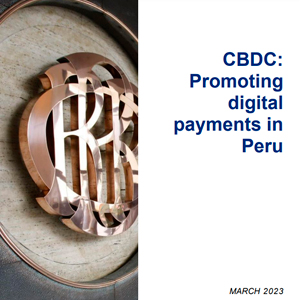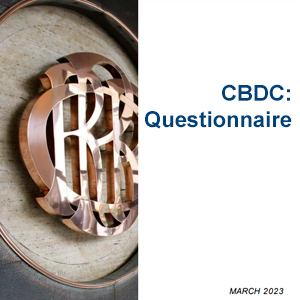
A Central Bank Digital Currency (CBDC) is sovereign money issued by the central bank in digital format, which can be held in accounts or through representations called tokens (digital representation with value). The CBDC can be created for payments between financial institutions (wholesale) or for use by individuals and businesses (retail), the latter being the field that generates the greatest interest, especially in emerging countries. In this regard, the design of a CBDC may imply a different allocation of roles and responsibilities between the central bank and the private sector.
Many central banks are evaluating the issuance of a CBDC being the main motivations for emerging countries the promotion of financial inclusion as well as the efficiency and security of the domestic Payment Systems.
To advance in the study of the possible issuance of a CBDC, the Central Reserve Bank of Peru (BCRP) requested Technical Assistance from the International Monetary Fund (IMF), which was agreed in May 2021. The Technical Assistance has facilitated progress during the research phase.
The document "CBDC: Promoting digital payments in Peru" is the first in a series referring to the work being carried out by the BCRP on the possible implementation of a CBDC with the aim of promoting access and use of digital payments, as well as strengthening the monetary and financial stability, and the security and efficiency of Payment Systems.
A survey is issued with the publication of the document to learn the views of the stakeholders, including market agents, on key aspects contained in the publication.
Subsequently, the input from surveys will be utilized to carry out a next phase of exploration, including a more targeted assessment and testing (“Innovation Challenges”) of specific aspects of digital payments, including CBDC. This next phase will convene and benefit from the views of technology providers, regulators, and experts from various fields.
 |
 |
The International Monetary Fund provided Technical Assistance in 2023, to contribute to the investigation into the possible implementation of a CBDC in Peru, where market agents participated. The results of said Technical Assistance are reflected in the following documents published on November 3, 2023:
Western Hemisphere Payments and Securities Clearance and Payments Initiative Payments and Securities Clearance and Settlement Systems in Peru (August 2000) Bank for International Settlements Publications of the Committee on Payment and Settlement Systems (CPSS)
Payments and Securities Clearance and Settlement Systems in Peru (August 2000)
Publications by the Committee on Payment and Settlement Systems (CPSS)
The Central Bank of Peru submitted to Congress a draft law on Payment and Securities Settlement Systems in order to strengthen these systems legal framework. This in turn will reinforce financial stability and the effectiveness of monetary policy.
The growth of commercial and financial transactions in both domestic and international markets has led to the development of clearing and settlement mechanisms for payments and securities transfers, which enable economic agents to settle their obligations by transferring funds and securities, and also contributes to channel monetary policy operations.
As these systems are considered to be of public interest, it is vital to promote their safety and efficiency, since they can trigger and transmit disturbances to participants and financial markets, threatening overall financial stability, because large values and volumes of funds and securities transfers among financial institutions and ultimately among economic agents are handled through them.
Payment and securities settlement systems that operate in a robust and clear legal enviroment not only make financial, commercial and investment transactions safe and dynamic, but also ensure the efficiency and effectiveness of monetary policy.
The draft law includes three key elements: legal protection, governance and transparency, and regulation and supervision.
Legal protection: the draft law protects transfer orders, resources, collateral constituted in these systems, as well as Central Bank credit, from judicial and administrative procedures, thus assuring that, even in the event of insolvency proceedings on a participant, funds and securities transfer orders are definitely processed and settled once they are accepted by the systems.
Governance and transparency: the draft law requires system administrators to establish rules and procedures which clearly indicate the governance arrangements, the rights and obligations of participants, the moment a transfer is accepted by the system (after which it enjoys legal protection), the procedures to manage financial and operational risks, as well as the collateral mechanisms.
Regulation and supervision: the Central Bank and the National Securities Commission are empowered as regulatory authorities of payment and securities settlement systems, respectively. In such a capacity, both entities are in charge of approving the rules and procedures of the systems, establishing the regulations, principles and standards, as well as supervising the compliance with the principles and regulations applicable to the systems.
Finally, the draft law strengthens the legal framework on payment and securities settlement systems and provides the basis for the implementation of safer and more efficient payment and securities settlement systems. The latter will enhance financial stability, the bankarization process as well as the effectiveness of the Central Banks monetary policy, all of which will contribute significantly to the countrys economic development.
Horario de atención:
Lunes a Viernes: 9:00 am - 4:30 pm
mesadepartesvirtual@bcrp.gob.pe
(Formato PDF, máximo 15 MB)
Horario de atención:
Lunes a Viernes: 9:15 am - 3:15 pm